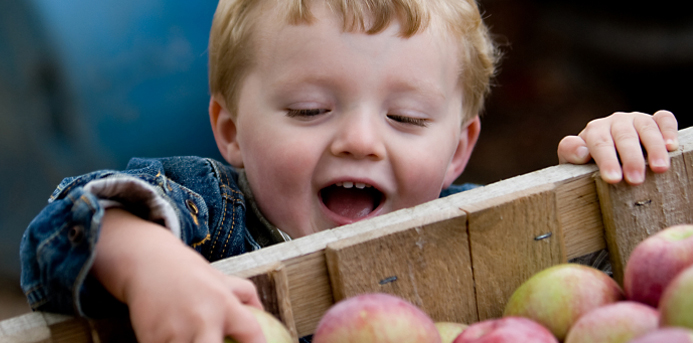School is out, but families can view the farmers’ market as a fun summer classroom.
Local farmers’ markets offer many educational opportunities for kids and adults of all ages.
With young children, Robin Frisch, M.S., Experience Director for Mindsplash and former teacher and director of an Early Learning Center, recommends that parents follow a child’s lead at the market.
“Observe what seems exciting to your child and use that as an opportunity to create fun and meaningful interactions! They don’t have to learn everything at once. If a child is particularly interested in one aspect, such as wanting to know how carrots grow, focus on that for this visit,” she says. “When you go home continue the discussion in ways that are fun for your child. The next visit will bring new discoveries and questions!”
Parents can also develop early literacy and number recognition by reading the signs at the market with their children. Another learning experience is classifying foods, either by color or by food group. Parents can also teach children about the five senses. They can see, taste, smell, touch and even hear if a farmer permits gentle thumping on melons.
“When it comes to children, the question we should be asking and answering is, ‘Where does food come from?’” says Dale Duda, market manager and President of the Northbrook Farmers’ Market Association. She says many believe the correct answer is mom, or the grocery store.
Often markets have an opportunity for children to plant seeds and get their hands in the soil, helping children comprehend the process of producing what they eat and just what goes into growing produce.
“There are always a wide variety of fresh fruits, vegetables, and other products for them to discover, and they can often try samples of new foods or see cooking demonstrations,” says Anne L. Alonzo, Agricultural Marketing Administrator at the U.S. Department of Agriculture.

Pictured: Barrington Farmers’ Market
Learning about healthy choices can also lead kids to discover new foods.
The Northbrook Farmers’ Market works to highlight produce that may be unfamiliar to kids and even parents, and also provides information about nutrients and ways to prepare those foods because, Duda believes, “parents should also be educating themselves about food and nutrition.”
Chicago’s Green City Market also offers Club Sprouts, an educational program for all ages attended by babies and teenagers alike, focusing on seasonal produce. “Curriculum is entirely based on seasons. What food they’re tasting or learning about any given week is ideally what is at peak season,” says Erin Riley-Strong, Communications Coordinator for Chicago’s Green City Market.
An educational program is not always necessary, however. Simply walking around the market and observing can be a great way to learn, especially about the relationship between food and the seasons, according to Riley-Strong.
“Last year, I had a 6- or 7-year-old ask me why we didn’t have any tomatoes in June. It was a great opportunity to talk about seasonal produce, how tomatoes take a long time to grow and need lots of warmth before they’re ready to be picked,” she says.
Regular trips to the market will help kids see how the market changes over time. Parents can give children a dollar amount to spend and put them in charge of procuring a balanced dinner for the family. Doing so once a month during the market season will give them an opportunity to see how the produce options vary as well as a chance to do some elementary math and even learn basic economics.
Friendly faces at the market provide an opportunity for kids to make some of their first purchases and learn how to handle transactions or ask questions of strangers in a safe environment. Alonzo suggests talking to those farmers and asking them questions about where the food comes from and how it is raised.
“The farmers love to talk to people, including the kids,” Duda says.
The opportunity for interaction facilitates the formation of connection and a sense of community, something Alonzo sees as a great benefit of farmers’ markets.
She says that the interest in local food has helped “connect urban and rural communities to each other, here in Chicago and around the country. I think it will also lead to a greater respect for the people who grow and raise our food in the general public, and it has the potential to inspire young people to want to be involved in food production.”
Frisch agrees. “A Farmer’s Market also brings a sense of community to children, as they understand how we each have our jobs to do to make our community a better place to live for all.”

